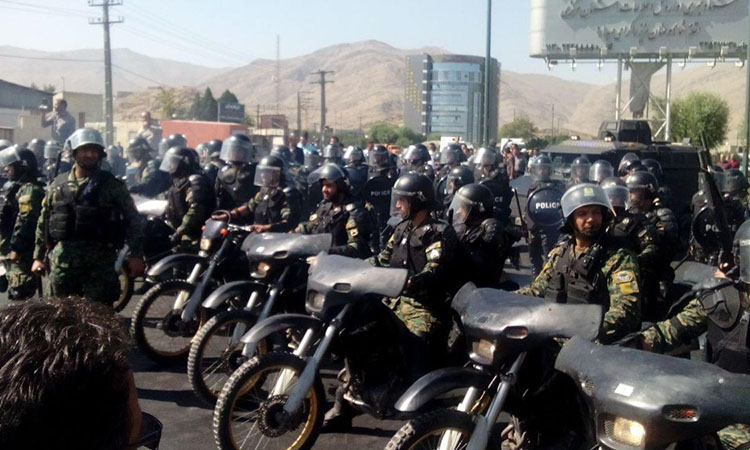CHRI – The governor of Tehran Province, Mohammad Hossein Moghimi, has erroneously declared that since President Hassan Rouhani took office in 2013, protests in Iran’s capital city have been tolerated without the use of force.
 In reality, since Rouhani became president, police and security forces in Tehran have broken up several peaceful protests and arrested numerous people for taking part in them.
In reality, since Rouhani became president, police and security forces in Tehran have broken up several peaceful protests and arrested numerous people for taking part in them.
“Since Mr. Rouhani’s first government came into effect four years ago, we have not had any sort of confrontation with lawful political gatherings that had official permits,” Moghimi told the semi-official Iranian Labor News Agency (ILNA) on November 10, 2017.
“Everyone who succeeded in getting a permit from the Interior Ministry for their public gatherings held their events without any confrontation against them,” he added.
The governor’s comments overlooked protests that took place in Tehran between 2013 and 2016. During that time, peaceful protestors—at gatherings advocating against acid attacks on women, labor rights rallies, and events by the families of political prisoners—were met with violent force by police and other local security forces.
Moghimi also stated that during Iran’s May 2017 presidential and local councils elections, “hundreds of speeches were held in Tehran and yet we did not have a single problem, and there were no confrontations with the organizers or participants.”
Breaking up such peaceful protests would be a violation of Chapter 7 of the Presidential Election Law, which allows candidates to hold campaign rallies and promote their views until 24 hours before the vote begins.
Article 27 of Iran’s Constitution also states that, “Public gatherings and marches may be freely held, provided arms are not carried and that they are not detrimental to the fundamental principles of Islam.”
In his interview with ILNA, Moghimi also incorrectly stated that people were allowed to hold rallies in front of Parliament.
“The public gatherings in front of Parliament are not a security problem,” he said. “People are comfortable with expressing their views to the representatives. We have never had a security issue with these gatherings.”
“Incidentally we want to create a special area for these gatherings where people can voice their protests,” he added.
Contrary to the governor’s statement, on November 21, 2016, dozens of supporters of imprisoned spiritual leader Mohammad Ali Taheri were beaten in front of Parliament by plainclothes security agents and arrested by the police. The protesters were attempting to deliver letters to lawmakers about Taheri’s plight in Evin Prison.
Political prisoner Ali Shariati, a long-time supporter of Rouhani, is serving a five-year prison sentence for the charge of “acting against national security” for participating in a protest against acid attacks in front of the Parliament building in Tehran on October 22, 2014.
Participating in a rally against acid attackers in front of Parliament on October 22, 2014, was among the charges laid against prominent human rights activist Narges Mohammadi, who is serving a 16-year sentence in Evin Prison for her peaceful activism.
“Even my presence at a gathering outside the Parliament to protest against acid attacks is reflected as ‘participation in riots.’ I was extensively interrogated on this subject,” Mohammadi told the Center for Human Rights in Iran (CHRI) in April 2015.
“I said I participated in a peaceful gathering with hundreds of other citizens, but the interrogator insisted that it was a riot,” she said.
On December 4, 2016, a rally in front of the Tehran Municipality building by bus drivers peacefully demanding their past due housing allowances and other benefits was violently attacked by anti-riot police, who arrested several senior members of the Tehran Bus Drivers’ Union, including Reza Shahabi, Davoud Razavi, Ebrahim Madadi, and Mansour Osanloo.
 Shabtabnews In this dark night, I have lost my way – Arise from a corner, oh you the star of guidance.
Shabtabnews In this dark night, I have lost my way – Arise from a corner, oh you the star of guidance.


